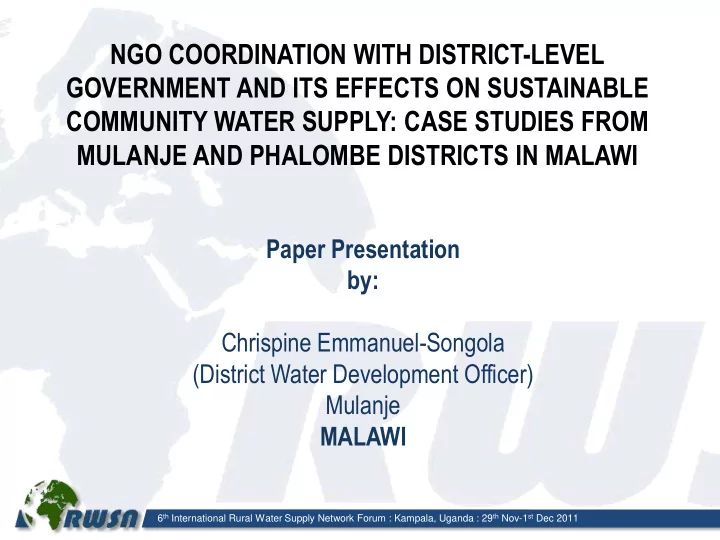

NGO COORDINATION WITH DISTRICT-LEVEL GOVERNMENT AND ITS EFFECTS ON SUSTAINABLE COMMUNITY WATER SUPPLY: CASE STUDIES FROM MULANJE AND PHALOMBE DISTRICTS IN MALAWI Paper Presentation by: Chrispine Emmanuel-Songola (District Water Development Officer) Mulanje MALAWI 6 th International Rural Water Supply Network Forum : Kampala, Uganda : 29 th Nov-1 st Dec 2011
Location: 6 th International Rural Water Supply Network Forum : Kampala, Uganda : 29 th Nov-1 st Dec 2011
Context: o Government adopted Decentralisation Policy — Devolution of functions — Decentralisation structures established o Ministry of Irrigation & Water Devpt revised Policies — Water Policy (Revised 2007) — Sanitation Policy — Water resources Act (Underway) 6 th International Rural Water Supply Network Forum : Kampala, Uganda : 29 th Nov-1 st Dec 2011
Methodology: o Studied 3 NGO funded Projects & 1 Government initiated pilot project — Ntalava Water Scheme (Phalombe – Action Aid) — Borehole Rehab Project (Mulanje – World Vision) — New BH Construction Projects (Plan Malawi) — Play pump installation Pilot Project (Ministry) o Comparison of Impacts o Stakeholders Interviews & review of District Reports 6 th International Rural Water Supply Network Forum : Kampala, Uganda : 29 th Nov-1 st Dec 2011
Results: Ntalava Water Scheme (Action Aid) Borehole Rehabilitation (WVI) 6 th International Rural Water Supply Network Forum : Kampala, Uganda : 29 th Nov-1 st Dec 2011
Results: Play pumps New BH Construction (Plan Mw) 6 th International Rural Water Supply Network Forum : Kampala, Uganda : 29 th Nov-1 st Dec 2011
Conclusion: o NGO coordination with District Water Offices helps to achieve: - High resource productivity and sustainable infrastructure performance. - High levels of stakeholder participation, and a sense of community ownership and responsibility. - Improved sectoral service management While o NGO working in isolation: - Duplicate efforts, sometimes waste more resources but achieve low levels of infrastructure performance - Achieve low stakeholder participation & lack of community sense of ownership - Derails sectoral service management 6 th International Rural Water Supply Network Forum : Kampala, Uganda : 29 th Nov-1 st Dec 2011
VISION FOR THE FUTURE: A fully integrated NGO/District Govt Development Machinery o NGOs should institute means to facilitate joint planning and effective information networking with District-level Governments. o NGOs should institute mechanisms for promoting work collaboration with District-level Governments to maximise resource utilisation. o District Authorities should regularly update District Development Plans and provide guidance on district stakeholders collaboration o District Governments should draw standardized feedback mechanisms that enable active participation in M&E of the NGO funded programs. 6 th International Rural Water Supply Network Forum : Kampala, Uganda : 29 th Nov-1 st Dec 2011
Thank you for Your Attention 6 th International Rural Water Supply Network Forum : Kampala, Uganda : 29 th Nov-1 st Dec 2011
Recommend
More recommend